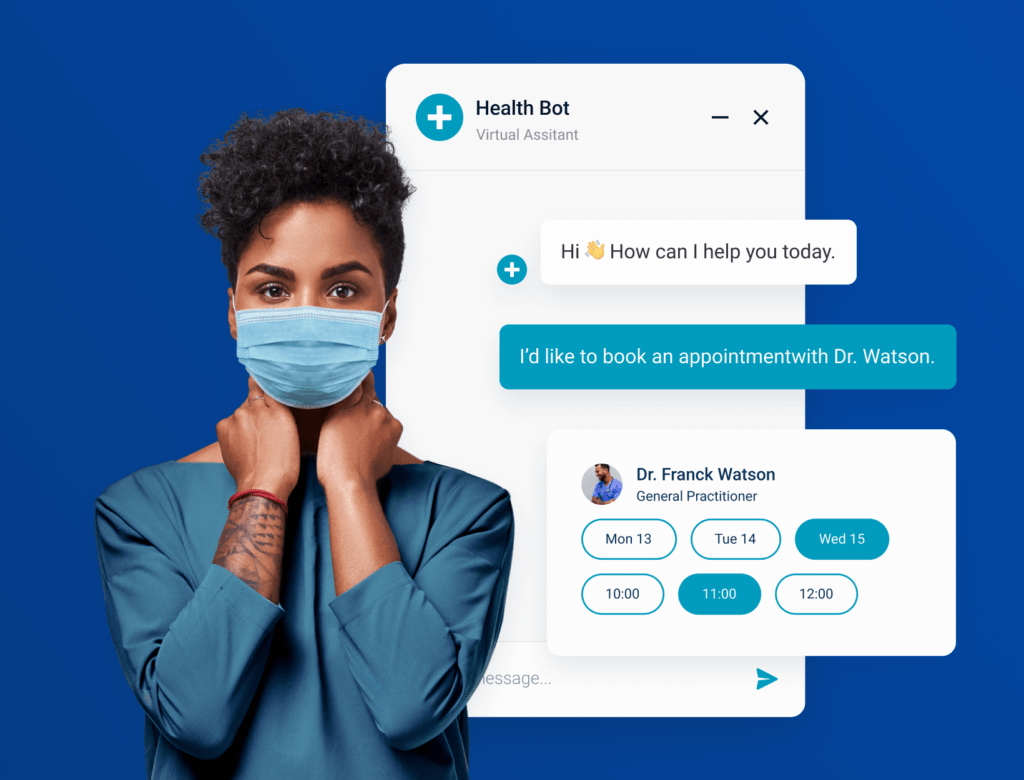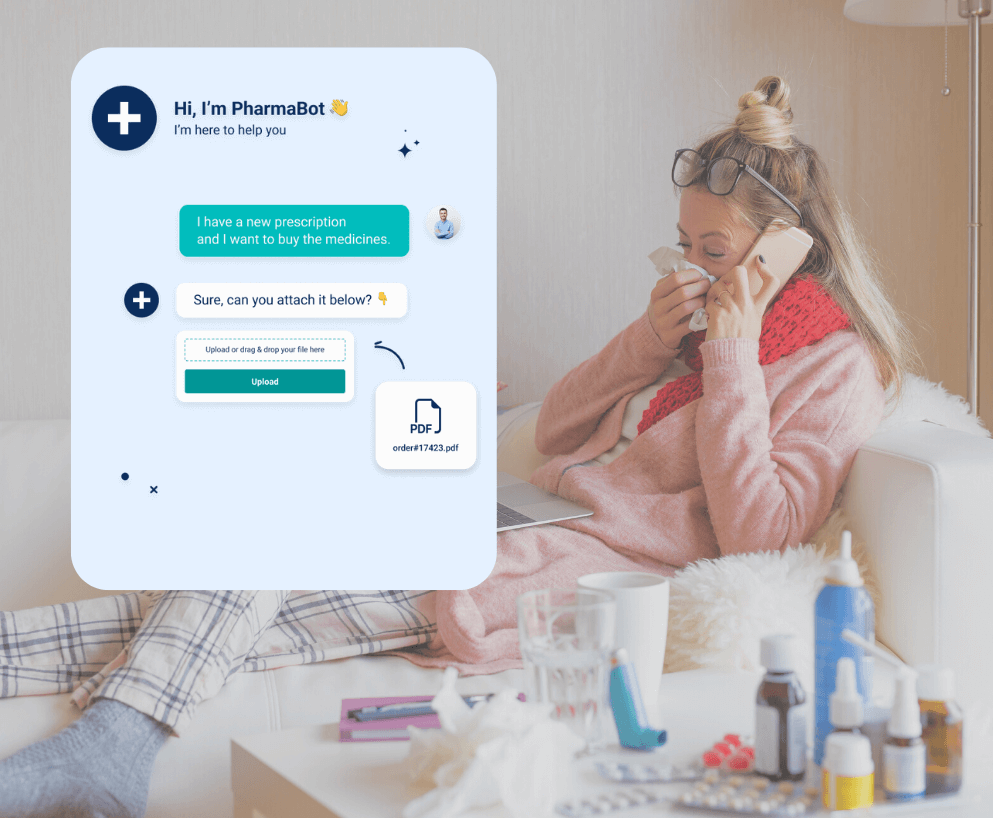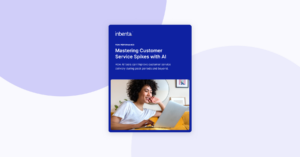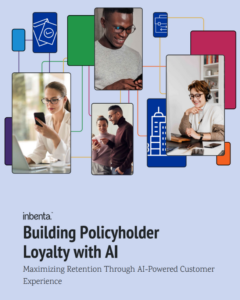There’s no denying it: the healthcare industry is experiencing rapid changes and advancements in technology every year. Artificial intelligence (AI), Neuro-Symbolic AI, and Natural Language Processing (NLP) are just a few of the many innovations making their way into hospital systems, research labs, and doctor practices.
In recent years, virtual assistants and AI-powered conversational chatbots have taken the center stage, popping up in hospitals, labs, pharmacies, and even nursing homes. And for good reason. In the age of digital customer experience, customers expect fast and convenient interactions. In fact, an extensive study by Verified Market Research showed that the healthcare chatbot’s market size is currently valued at USD 194.85 Million in 2021 and is projected to reach USD 943.64 Million by 2030, growing at a CAGR of 19.16% from 2022 to 2030.

In this blog post, we’ll explore the key benefits and use cases of healthcare chatbots and why healthcare companies should invest in chatbots right away.
What is a Healthcare Chatbot?
Healthcare chatbots are the next frontier in virtual customer service as well as planning and management in healthcare businesses. A chatbot is an automated tool designed to simulate an intelligent conversation with human users.
AI-powered healthcare chatbots are capable of handling simple inquiries with ease and provide a convenient way for users to research information. In many cases, these self-service tools are also a more personal way of interacting with healthcare services than browsing a website or communicating with an outsourced call center. In fact, according to Salesforce, 86% of customers would rather get answers from a chatbot than fill out a website form. The healthcare industry is no different.
Benefits of Chatbots in Healthcare
Here are some key benefits of using chatbots in your healthcare business:
24/7 availability
Chatbots are designed to assist patients and avoid issues that may arise during normal business hours, such as waiting on hold for a long time or scheduling appointments that don’t fit into their busy schedules. With 24/7 accessibility, patients have instant access to medical assistance whenever they need it.
Reduce waiting time
With AI technology, chatbots can answer questions much faster – and, in some cases, better – than a human assistant would be able to. Chatbots can also be programmed to recognize when a patient needs assistance the most, such as in the case of an emergency or during a medical crisis when someone needs to see a doctor right away.
Quick access to critical info
Healthcare chatbots can offer this information to patients in a quick and easy format, including information about nearby medical facilities, hours of operation, and nearby pharmacies and drugstores for prescription refills. They can also be programmed to answer specific questions about a certain condition, such as what to do during a medical crisis or what to expect during a medical procedure.
Provide assistance
From helping a patient manage a chronic condition better to helping patients who are visually or hearing impaired access critical information, chatbots are a revolutionary way of assisting patients efficiently and effectively. They can also be used to determine whether a certain situation is an emergency or not. This allows the patient to be taken care of fast and can be helpful during future doctor’s or nurse’s appointments.
Reduce care costs
Being able to reduce costs without compromising service and care is hard to navigate. Healthcare chatbots can help patients avoid unnecessary lab tests and other costly treatments. Instead of having to navigate the system themselves and make mistakes that increase costs, patients can let healthcare chatbots guide them through the system more effectively.
Anonymity
While many patients appreciate receiving help from a human assistant, many others prefer to keep their information private. Chatbots are seen as non-human and non-judgmental, allowing patients to feel more comfortable sharing certain medical information such as checking for STDs, mental health, sexual abuse, and more.
Improve patient satisfaction
A big concern for healthcare professionals and patients alike is the ability to provide and receive “humanized” care from a chatbot. Fortunately, with the advancements in AI, healthcare chatbots are quickly becoming more sophisticated, with an impressive capacity to understand patients’ needs, offering them the right information and help they are looking for.
9 Use Cases and Examples of Chatbots in Healthcare
Healthcare businesses are turning to chatbots to help patients, doctors, and other staff communicate more efficiently. Here are some use cases of chatbots in healthcare businesses:
1. Schedule appointments
Healthcare chatbots can use information about the patient’s condition, allergies, and insurance information to schedule appointments faster and better. This includes:
- Finding a slot at a specialized health facility or lab test center
- Rescheduling appointments that are missed or canceled
- Scanning through the patient’s and doctor’s schedule to find the most appropriate time slot
- Pre-booking appointments to facilitate a patient’s treatment plan
- Integrating into the user’s device calendars to send reminders and updates about medical appointments
2. Assess symptoms
Chatbots can ask patients questions to assess symptoms. This is especially helpful if the patient is too sick to get out of bed. And in case a patient does not feel well enough to type full explanations, the healthcare chatbot can prompt the patient with questions like:
- “Are you having any pain?”
- “Where specifically are you feeling the pain?”
After the patient responds to these questions, the healthcare chatbot can then suggest the appropriate treatment. The patient may also be able to enter information about their symptoms in a mobile app.
3. Take care of coverage and claims
Patients who feel overwhelmed by all the paperwork can take advantage of healthcare chatbots to navigate the system successfully without having to call in. This usually addresses instances of filing for coverage and claims:
Coverage: If a patient is seeking coverage for a medical procedure, the healthcare chatbot can guide them through the process by asking questions about the procedure and their insurance coverage.
Claims: If the patient is seeking reimbursement for a medical procedure, the healthcare chatbot can walk them through the process of filing a claim.
4. Provide mental health assistance
Healthcare chatbots can provide mental health assistance, 24/7. This can be critical to those living in rural areas where mental health resources are scarce, or for people experiencing a crisis in the middle of the night when “human help” is not available. A chatbot can:
- Offer self-help tips like meditation, relaxation exercises, and positive affirmations
- Connect people with mental health experts who can help them with specific challenges related to living with a mental illness
- Connect patients with other people who are going through similar struggles, providing peer support and a community
5. Collect patients’ data and feedback
When using a healthcare chatbot, a patient is providing critical information and feedback to the healthcare business. This allows for fewer errors and better care for patients that may have a more complicated medical history. The feedback can help clinics improve their services and improve the experience for current and future patients. Overall, this data helps healthcare businesses improve their delivery of care.
6. Set vaccination reminders
Healthcare chatbots can remind patients about the need for certain vaccinations. This information can be obtained by asking the patient a few questions about where they travel, their occupation, and other relevant information. The healthcare chatbot can then alert the patient when it’s time to get vaccinated and flag important vaccinations to have when traveling to certain countries.
7. Request prescription refills
Consistency is key to getting better. Healthcare chatbots can remind patients when it’s time to refill their prescriptions. But it doesn’t stop there. These smart tools can also ask patients if they are having any challenges getting the prescription filled, allowing their healthcare provider to address any concerns as soon as possible.

8. Locate healthcare services
Healthcare chatbots can locate nearby medical services or where to go for a certain type of care. For example, a person who has a broken bone might not know whether to go to a walk-in clinic or a hospital emergency room. Healthcare chatbots can direct patients to the correct type of care. They can also direct patients to the most convenient facility, depending on access to public transport, traffic and other considerations.
9. Provide information about Covid or other public health concerns
Healthcare chatbots can provide information about public health concerns like COVID, flu and measles. Indeed, recent years have shown how healthcare chatbots have been used to assist without risking healthcare workers, including:
- Directing patients with severe symptoms to healthcare facilities with available staff and beds
- Providing around-the-clock information about COVID-19 updates and symptoms, and answering FAQs
- Scheduling next vaccinations and finding the closest vaccination clinic
- Providing mental health assistance to cope with pandemic stress
Ready to Integrate Conversational AI Chatbots in Your Healthcare Company?
The future is bright for healthcare workers and patients with AI technology. As experts predict the use use of chatbots to continue to grow, with a market size reaching USD 943.64 Million by 2030, this AI technology continues to improve over time, creating an even more humanized, safer, and more reliable experience for the patient.
So what does that mean for your healthcare business? Lower costs, less downtime, improved staff morale, and a much better – and more consistent – care service for your patients.










